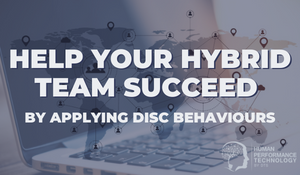How to Benefit from Behavioural Science at Work
What we do with behavioural science is very simple. We provide models for helping people to build better relationships with others, learn about their strengths and areas for development, and ultimately use that information to become more productive and fulfilled.
We find that most executives, managers and team members are sincerely interested in finding out more about themselves and how they can work with others more effectively. Just about everyone has experienced a painful “personality conflict” with another person at some point in their life, and they want to avoid those sorts of situations from happening again in the future.
People Are (Very) Different, Yet (Very) Similar
What’s interesting about people is that even though people are infinitely diverse in terms of their experiences and beliefs, all people on earth (regardless of age, race, culture or gender) share similar behavioural characteristics. One person you meet might be talkative, sociable and loud, whilst the next might be quiet, shy and methodical. Some people like structure and some don’t. Some like to move at a fast pace, others prefer to take their time.
These sorts of behavioural quirks can make ‘clicking’ with someone similar to you feel like a breeze, but for those who are not similar, it can make a relationship tricky, challenging, and even exhausting at times — particularly if you have to spend a lot of time with them.
Organisations that rely on teams to accomplish business goals can't afford to have personal differences get in the way of performance, and they need to ensure that team members are functioning in high-trust, low-friction environments. As part of creating high performance workplaces:
- managers need to know which team members are best suited to certain types of work;
- salespeople need to know how to create rapport with different types of prospects;
- recruiters need to understand a candidate’s potential strengths and weaknesses;
- customer service reps need to be able to communicate clearly.
In virtually every profession and for every type of role on the planet, the ability to effectively deal with others strongly distinguishes star performers from average or poor ones.
The good news is that researchers have discovered that there are 4 core patterns of behaviour that are both identifiable and predictable. This is often referred to as an individual’s behavioural style, which influences much of what they do.
What is a Behavioural Style?
Simply put, a behavioural style is:
- A person's natural way of doing things.
- The manner in which a person prefers to interact with others.
- How a person tends to act and communicate.
Having a behavioural model is the first step towards becoming a more effective communicator because it explains the basic communication tendencies that are present in each person throughout the world.
Effective communication stems from the right combination of tone, words, body language, pace of speech and actions — all of which are components of a person’s behavioural style. By understanding the common behavioural styles that exist in the workplace, you can learn how to treat people in a way that allows them to feel comfortable with you, so there’ll be less tension and better communication. This leads to increased trust, cooperation, respect, commitment and productivity.
Today, millions of people throughout the world use a behavioural model (based on insights from behavioural sciences) in a variety of different business applications, including:
- Management Training / Leadership Development
- Team Building / Team Effectiveness
- Sales Training
- Customer Service Training
- Communication Training
- Presentation Skills
- Employee Engagement
- Change Management
- Cultural Alignment
- Resolving and Preventing Conflict
- Coaching / Mentoring
- Induction
- Recruitment / Selection / Shortlisting
- Job Benchmarking
Curious to Learn More?
The behavioural model that is known throughout the world as the most effective is the four-factor DISC Model. It is estimated to be used by 75% of Fortune 500 companies. DISC is an acronym for Dominance, Influence, Steadiness and Compliance. An assessment was developed to help people understand their behavioural preference, including some of the ways we respond to problems and challenges (D), people and contacts (I), pace and consistency (S), and procedures and constraints (C).
Our cutting edge DISC assessment involves taking a 10-minute questionnaire online. Once completed, you will receive up to a 24-page, personalised report on your behavioural style with tips on how to be more effective when working with others. Check out our Complete Guide, and request a free sample DISC profile (or one of our multi-science profiles like Talent Insights or TriMetrix EQ).
Note: This blog post was originally shared in August 2012 under the title “Why 75 Percent of Fortune 500 Companies Use a Behavioural Model”. It was refreshed and republished in March 2022 with up to date information and context.

Theo Winter
Client Services Manager, Writer & Researcher. Theo is one of the youngest professionals in the world to earn an accreditation in TTI Success Insight's suite of psychometric assessments. For more than a decade, he worked with hundreds of HR, L&D and OD professionals and consultants to improve engagement, performance and emotional intelligence of leaders and their teams. He authored the book "40 Must-Know Business Models for People Leaders."


/Harnessing%20DISC%20for%20Effective%20Team%20Dynamics.png?width=374&name=Harnessing%20DISC%20for%20Effective%20Team%20Dynamics.png)
We Would Like to Hear From You (0 Comments)